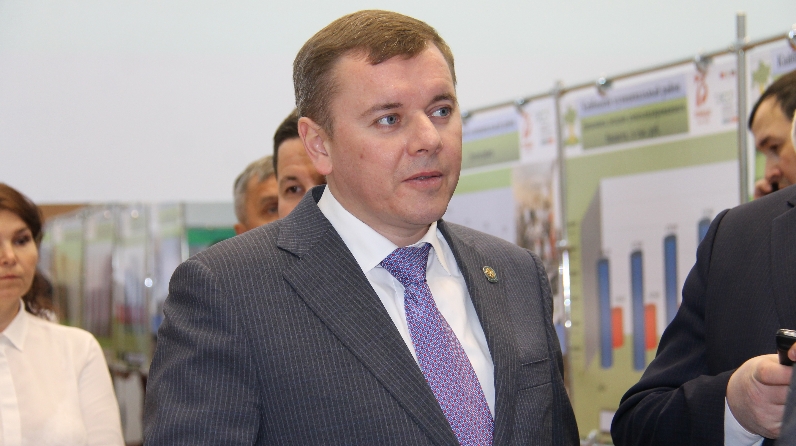Marat Zyabbarov called on entrepreneurs of the Kaybitsky district to focus on agricultural cooperation: “Today you can get up to 70 million rubles of state support”

On February 14, in the Kaybitsky district, a meeting of the Council was held on the results of socio-economic development for 2019 and the tasks for 2020 with the participation of Marat Zyabbarov.
Prior to the event, Marat Zyabbarov, accompanied by the head of the district, Albert Rakhmatullin, got acquainted with the activities of local enterprises at the exhibition launched on this occasion.
For example, from August 1, 2019, SL-Milk LLC launched the production of dairy products with a capacity of 2 tons per day in the Kaybitsky district and today presented guests with milk, kefir and sour cream of their own production.
The company "SL-Agro", specializing in the production of granular vitamin-grass meal based on dried alfalfa, has introduced a line of vitamin-protein products.
The agricultural cooperatives Yulduz and Soyuz Agro also presented their products. In December 2018, the cooperative Yulduz received a grant from the Ministry of Agriculture and Food of the Republic of Tatarstan in amount of 5 million rubles and built a modular meat processing workshop in 2019. Daily in the workshop, meat semi-finished products are produced from their own raw materials: sausages, dumplings, manti, cutlets, etc., which are in great demand among the population of the Kaybitsky district.
Agricultural Union Soyuz Agro has been involved in the purchase and sale of surplus vegetable products from the population of the Kaybitsky District for over 10 years. The cooperative also received a grant of the Ministry of Agriculture of the Republic of Tatarstan in April 2019 in the amount of more than 4 million rubles, and in October launched a comprehensive line for the reception, processing and pre-sale preparation of vegetables.
Rafail Fassakhov, who received an Agrostartup grant from the Ministry of Agriculture and Food of the Republic of Tatarstan for beginner farmers, presented his products.
The final session began with a report of the head of the district, Albert Rakhmatullin. “The Kaybitsky district continues to develop steadily, all the main state programs and national projects are implemented in the district,” the head of the district said, thanking the President of the Republic Tatarstan Rustam Minnikhanov and the Ministry of Agriculture and Food of the Republic of Tatarstan for the support.
In his report, Albert Ilgizarovich analyzed the key positions of the region’s economic development, emphasized the work and achievements of the region in the field of culture, education, health, youth policy and sports, small and medium enterprises, noting that there are new challenges ahead.
The head of the region also spoke about large-scale preparations for the celebration of the 75th anniversary of the Victory and the 100th anniversary of the foundation of the TASSR. The co-rapporteurs were the head of the Bolsherusakovsky rural settlement of the region Gabbas Zinnatullin and the representative of the Yulduz Ramil Shchukin.
The Head of the Ministry of Agriculture and Food of the Republic of Tatarstan Marat Zyabbarov introduced the session participants to the republic-wide indicators of economic development. “Agricultural issues for the republic have always been strategic, therefore, in 2019, 17.4 billion rubles were allocated to support agriculture. The agro-industrial complex employs 115 thousand people, including 71 thousand people in agriculture. The key role in ensuring employment and generating incomes of the rural population, in the sustainable development of rural territories is played by small forms of farming in the countryside, ”said Marat Zyabbarov.
In recent years, the status of small forms of farming has grown significantly, the volumes of private and peasant farms in the value of gross output have increased. The Republic of Tatarstan is successful: more than 450 thousand private farms, 4 thousand 600 farms, more than 1 thousand 200 family farms operate there.
In the development of agrarian forms of business, agricultural cooperation plays a large role. Marat Zyabbarov noted that in the Kaybitsky district there are huge reserves for the further development of this direction. Therefore, it is necessary this year to take advantage of existing programs that allow cooperatives to receive state support in the amount of up to 70 million rubles.